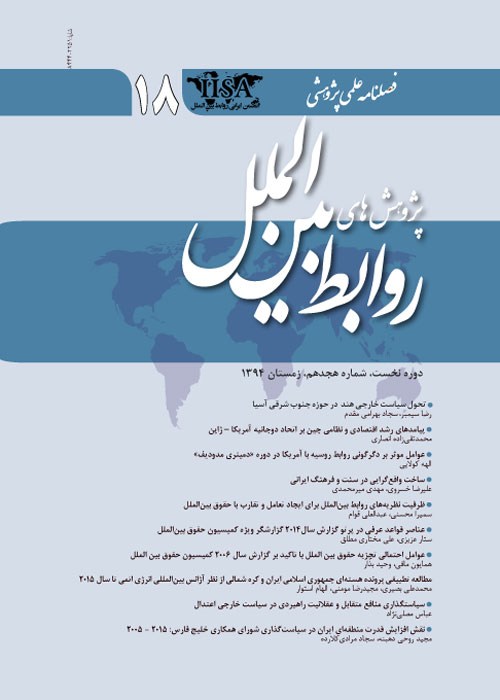Mutual interest policy making and strategic rationality on moderation Iran's foreign policy
Author(s):
Abstract:
The diplomacy of moderation can be taken as a reaction to the radical trends in certain periods of Irans diplomacy and diplomatic relations. The signs of radicalism were evident in two historical periods: The first historical phase related to reflection of waves of revolution development. This has been emphasized in the theory of Crane Brinton. Conducting comparative study of the big revolutions of history, Crane Brinton came to the conclusion that any social revolution inevitably passes through four historical junctures. The revolutionary honey moon period, which is the phase of liberals coming to power and the phase of coming to power of radicals, consist of four periods of revolutionary development until the time the front turns into political system. The diplomacy of moderation has two signs of mutual interest policy making and decision making with rational model in the strategic domain. The research at hand tries to investigate signs of the diplomacy of moderation in the main strategic issues of Iran: The nuclear diplomacy and regional diplomacy. The two main issues were the main challenges of Irans security and foreign diplomacy in the years 2009-2013. The big powers are the main pivot of Irans foreign policy challenge in nuclear domain, while Turkey, Saudi Arabia, Egypt, Qatar, the UAE and Israel can be accounted for the fundamental challenges posed to Irans foreign policy in the region. In this article, the diplomacy of moderation was dependent variable, while the policy making of mutual interest and strategic rationality in the region were elements forming the independent variable. In defining the diplomacy of moderation, the neo-liberal approach was used. The goal of such a process is to make sure the pattern of action of players, being dissident to Iran, devoid of any security features.
Keywords:
Language:
Persian
Published:
International Relations Research Quarterly, Volume:5 Issue: 4, 2016
Page:
241
magiran.com/p1617396
دانلود و مطالعه متن این مقاله با یکی از روشهای زیر امکان پذیر است:
اشتراک شخصی
با عضویت و پرداخت آنلاین حق اشتراک یکساله به مبلغ 1,390,000ريال میتوانید 70 عنوان مطلب دانلود کنید!
اشتراک سازمانی
به کتابخانه دانشگاه یا محل کار خود پیشنهاد کنید تا اشتراک سازمانی این پایگاه را برای دسترسی نامحدود همه کاربران به متن مطالب تهیه نمایند!
توجه!
- حق عضویت دریافتی صرف حمایت از نشریات عضو و نگهداری، تکمیل و توسعه مگیران میشود.
- پرداخت حق اشتراک و دانلود مقالات اجازه بازنشر آن در سایر رسانههای چاپی و دیجیتال را به کاربر نمیدهد.
In order to view content subscription is required
Personal subscription
Subscribe magiran.com for 70 € euros via PayPal and download 70 articles during a year.
Organization subscription
Please contact us to subscribe your university or library for unlimited access!


